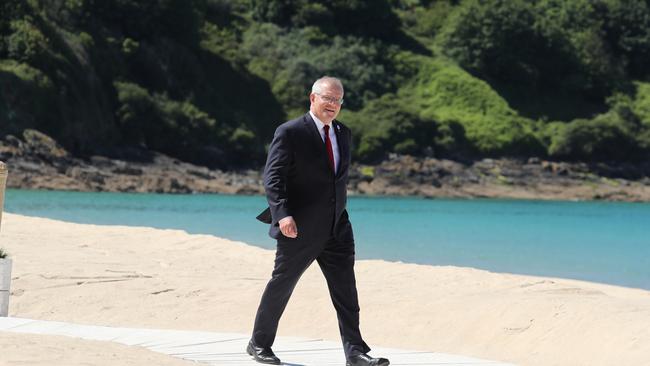
Therefore, it’s a good G7 for Australia.
Not everything about it has gone Scott Morrison’s way but it was good to be invited and the outcomes were generally positive for Canberra.
The No 1 strategic concern for Australia is China, and almost everything the G7 did was under the shadow of China and in response to China.
Therefore the determination of wealthy democratic countries to provide more and better infrastructure funding so that low and middle income countries have an alternative to Beijing’s Belt and Road money, with all its strings and traps and geo-strategic purposes, is a very good thing.
Similarly, the G7 still wants to find out how Covid-19 began and why. It is certainly better for Australia to be running this argument among the G7 than on its own, but I am still a bit baffled about why Morrison wants to run it at all.
It was perfectly sensible to support US President Joe Biden’s direction to his own intelligence agencies to come up with a net assessment of what the probabilities are that the virus came to us naturally or whether it might have escaped from a Chinese lab.
Given there is zero chance Beijing will co-operate, and that calling for the inquiry on our own last year caused us such grief with Beijing, it’s difficult to see what Australia gets out of this.
On climate change, China is central to the G7’s deliberations in a way that is not helpful to Australia. G7 members who don’t want to offend China under any circumstances – notably Germany and Italy – keep saying the West needs to keep Beijing onside so it will co-operate on climate change. This is a perfect excuse for weak Western leaders to do whatever Beijing tells them and to keep quiet about egregious Beijing human rights abuses in Xinjiang, or Hong Kong, or in matters like freedom of religion.
But if combatting climate change is so obviously in everyone’s interests, why does Beijing need to be talked into it?
Moreover, the British and European media seem to accept that Beijing is doing its bit on climate whereas in fact Beijing is surging ahead with coal-fired power stations at a huge rate. Last year, it commissioned more new coal power than exists in the entirety of Australia. It has approved plans for expansions that would be greater than the entire American coal power capacity. No one calls Beijing out on that.
The G7 wants Australia to commit to net zero emissions by 2050. Morrison is right to resist this and stick with net-zero emissions as soon as possible.
Avoiding European carbon tariffs, as a result of rejecting this unattainable trophy declaration, will be a high priority for Australian diplomacy.
Morrison’s first meeting with Biden was perplexing. It turned into a trilateral summit with Boris Johnson attending as well, and focused on defence co-operation and intelligence matters.
It’s a good thing for the three most important members of the Five Eyes intelligence arrangements to put their heads together, but Morrison had never met Biden and Biden is a quintessential Senate Democrat wheeler and dealer for whom personal relationships are everything.
Within the Biden court, there are those who value Australia as a steadfast ally but also woeful woke warriors whose narrowness of vision and misunderstanding of the world leads them to see Australia as a complacent, semi-racist nation led by reactionary know-nothings. Morrison not having one-to-one face time with the President is perplexing.
Similarly, failure to finalise a UK-Australia free-trade agreement can’t be called a success.
More good than bad, but not entirely a triumph.




This has been a good meeting of the G7 and its democratic friends in shoring up strategic coherence, the sense of identity, of the West.